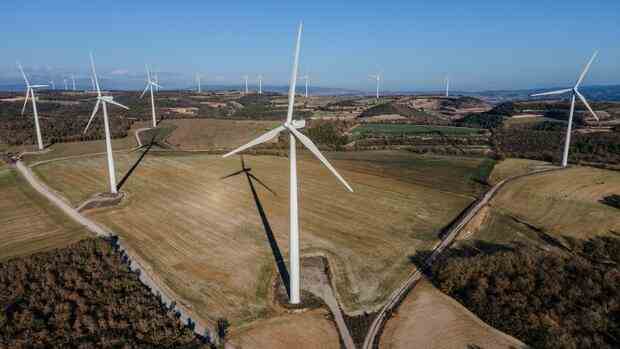Brussels, Madrid There is not much time left: In March, the EU Commission wants to present a reform of the electricity market. It shouldn’t be much later, because decisions in the EU take a long time and the time window for new laws closes towards the end of the year. After that, the election campaign overshadows all discussions, and the European Parliament is to be re-elected in spring 2024.
Spain and France are now increasing the pressure. With the reform, you want to lower electricity prices in particular. Both governments have sent out discussion papers with their ideas on this – and presented them to the public immediately. “We have the same vision of a structural and fundamental reform of the electricity market,” said French President Emmanuel Macron recently at a meeting with Spain’s Prime Minister Pedro Sánchez in Barcelona.
The Spanish proposals aim to limit the impact of high gas prices on electricity prices. This should happen primarily because the electricity from renewable energies is sold less frequently on spot markets and more frequently via fixed supply contracts. “Long-term contracts create price stability for consumers and producers and align electricity prices with average production costs,” says the proposal that Madrid sent to Brussels and which is available to the Handelsblatt.
France wants to go further. The paper, published by Contexte magazine, describes a fund that will collect the profits from all wind, solar and nuclear power plants and give them back to consumers. At the same time, the fund should guarantee these producers a minimum price for electricity.
Top jobs of the day
Find the best jobs now and
be notified by email.
The French would thus continue a rule that has been in force throughout the EU since autumn: especially in the summer, the price of gas drove up the price of electricity and thus brought extremely high profits to producers of renewable energy and nuclear power. Some of these profits are now skimmed off.
Electricity market: Experts fear a step backwards in market liberalization
But the hope for low electricity prices that Spain and France are raising with their proposals could be deceptive. Experts and MPs are skeptical about the Handelsblatt.
>> Read here: Federal Ministry of Economics wants to promote the construction of gas-fired power plants
Christian Ehler, energy expert of the CDU in the European Parliament says: “A change in the market design will not work miracles. Policies against the markets are expensive, difficult and unsustainable.”
The electricity market expert Lion Hirth from the Berlin Hertie School says: “The French proposal is obviously aimed at the state controlling investments and transfer prices in detail. That would massively reverse the liberalization of the past decades.”
According to the ideas of the Spaniards, new solar and wind power plants should be put out to tender and then sold at auction. This results in electricity prices that then apply over the entire expected service life of a system.
France and Spain want to restructure the European electricity market and have now presented proposals for this.
(Photo: dpa)
If the actual price on the spot market is higher, the producer pays the difference to the regulator. If it is lower, the regulator pays the producer. This is regulated in so-called contracts for difference (CfD).
Experts still see room for interpretation of the Spanish proposals. “Both tenders for the capacity of new renewables plants and contracts for difference already exist and are also used in many Member States,” says Diego Rodríguez, an energy expert at the Complutense University in Madrid. “The question is whether Spain wants to introduce them as a complement to the existing system – that’s how I understand the proposal. Or whether Madrid wants to use it to replace the existing spot market system.”
>> Read here: Spain’s economy minister on energy costs – “Our approach was very different from the German one”
The proposal is not clear, especially when it comes to the question of whether the system of auctions and contracts for difference should also apply to existing plants. “The regulator can also hold separate auctions for existing renewable energy plants,” the Spanish text reads. Rodriguez sees this as “the really new” thing about Madrid’s move.
Hectic in the EU Commission
In the face of such great ambiguity, many in the energy industry doubt that a quickly drafted reform will solve more problems than it creates. Commission President Ursula von der Leyen had promised a “profound and comprehensive reform of the electricity market” in the summer.
However, the last such reform had a lead time of nine years before it came into force in 2019. For the proposal due in March, there is not even an impact assessment like the one the EU Commission prepares before important legislative projects.
The energy expert does not expect that the EU Commission will be able to present a law in the spring.
(Photo: Hertie School)
“I think it’s unrealistic that the Commission will be able to present a mature legislative proposal in March,” says energy expert Hirth.
Federal Minister of Economics Robert Habeck (Greens) does not want to block the discussion. “I think you can discuss that,” he said at the Handelsblatt energy summit on the Spanish proposal. After all, Habeck also wants to reduce electricity prices for industry.
>> Read here: Economics Minister Habeck demands European industrial electricity price
Without intervention, prices can be expected on the market in the medium term that are above those with which the industry can work competitively.
However, this problem could also be solved without changing the basic rules on the electricity market. Habeck called for a European solution for industrial electricity prices, i.e. for reduced tariffs from which electricity-intensive companies can benefit.
More: Billions for the expansion of the power grid – Germany is aiming for a direct stake in Tennet
